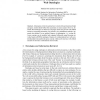Free Online Productivity Tools
i2Speak
i2Symbol
i2OCR
iTex2Img
iWeb2Print
iWeb2Shot
i2Type
iPdf2Split
iPdf2Merge
i2Bopomofo
i2Arabic
i2Style
i2Image
i2PDF
iLatex2Rtf
Sci2ools
142
click to vote
SEMWEB
2005
Springer
2005
Springer
Modeling Degrees of Conceptual Overlap in Semantic Web Ontologies
Information retrieval systems have to deal with uncertain knowledge and query results should reflect this uncertainty in some manner. However, Semantic Web ontologies are based on crisp logic and do not provide well-defined means for expressing uncertainty. We present a new probabilistic method to approach the problem. In our method, degrees of subsumption, i.e., overlap between concepts can be modeled and computed efficiently using Bayesian networks based on RDF(S) ontologies. Degrees of overlap indicate how well an individual data item matches the query concept, which can be used as a well-defined measure of relevance in information retrieval tasks. 1 Ontologies and Information Retrieval A key reason for using ontologies in information retrieval systems, is that they enable the representation of background knowledge about a domain in a machine understandable format. Humans use background knowledge heavily in information retrieval tasks [7]. For example, if a person is searching f...
Related Content
| Added | 28 Jun 2010 |
| Updated | 28 Jun 2010 |
| Type | Conference |
| Year | 2005 |
| Where | SEMWEB |
| Authors | Markus Holi, Eero Hyvönen |
Comments (0)

